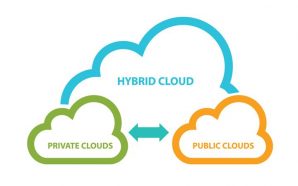Hybrid cloud hosting merges characteristics of the private cloud and the public cloud. In other words, a hybrid cloud computing model is one in which the business integrates 2 cloud computing infrastructures. Thus, you can take advantage of the features of both models without compromising performance, operating costs, or even privacy.
If well planned, the hybrid cloud perfectly meets the need to create a high-performance environment and control for any company’s internal routines. In this case, while all solutions will have their scalability comparable to that of public environments, the IT manager can define security policies according to internal demands.
With the hybrid cloud, the use of IT solutions becomes more flexible. Thus, there is no need to target processes according to the type of cloud computing implementation adopted by the business. To do this, just choose one that is aligned with the profile of the venture.
Benefits of Hybrid Cloud Hosting
The adoption of the hybrid cloud can benefit the company in different ways. Uniting cloud computing in public environments with cloud computing in private environments brings more flexibility and versatility to the business. Follow the main benefits!
Operational Flexibility
With the hybrid cloud, the company is able to use different types of cloud computing services without compromising its operational mobility or digital security. As this architecture unites 2 different types of cloud computing, the business can easily create an infrastructure tailored to its work profile.
Reduction of Costs
By not relying entirely on a private infrastructure, the hybrid cloud helps the company reduce its IT costs. This leaves more resources to make strategic investments and optimize business activities.
Ability to Scale Resources
If needed, a company that has a hybrid cloud infrastructure can quickly scale its services in the private environment. Migrating part of the operations to the public environment, the business is able to respond to the market with agility and, thus, is able to take advantage of the opportunities that arise.
Is Hybrid Cloud Hosting More Complex?
It’s safe to say that a hybrid cloud infrastructure is far more complex from an IT standpoint than a public or private cloud. As this format uses both services, an understanding of the weaknesses and advantages of each model is needed, as well as the best ways to integrate them.
Another challenge is the compatibility of applications and services between different platforms. It is crucial to be certain that the necessary functionality is transferred. It is also important to make sure that no data type is left behind in this process.
On the other hand, although more complex, the hybrid cloud is certainly more efficient at meeting varied and flexible demands of organizations, which means that most likely its cost will be much lower than that of a private cloud, and its security will be greater than that of a public cloud.
Featured Image: depositphotos/djv






